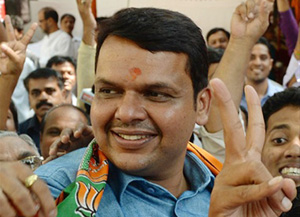Mumbai, Oct 28: Devendra Fadnavis was today elected the leader of the BJP Legislature Party in Maharashtra, paving the way for his appointment as the first party Chief Minister of the state.
The name of Fadnavis, state BJP president, was proposed by Leader of Opposition in the outgoing Assembly Eknath Khadse and seconded by his counterpart in the Legislative Council Vinod Tawde, and members of the party's core group Sudhir Mungantiwar and Pankaja Munde.
The resolution proposing 44-year-old Fadnavis as the leader of the Legislature Party was unanimously approved by the newly elected MLAs in the presence of Union Home Minister Rajnath Singh and BJP general secretary in-charge of Maharashtra J P Nadda, who were appointed central observers for the elction.
Fadnavis, accompanied by other members of state BJP Core Committee, will call on Governor C Vidyasagar Rao at Raj Bhavan at 6.30 pm to formally stake claim to form his government.
The new government will be sworn in at a ceremony at Wankhede Stadium on October 31 in the presence of Prime Minister Narendra Modi, several of his Cabinet colleagues and Chief Ministers of BJP-ruled states.
Though Fadnavis, with his RSS roots and backing of both Prime Minister Narendra Modi and BJP chief Amit Shah, was a clear frontrunner for the coveted post ever since BJP emerged as the single largest party in the state for the first time, several seniors had thrown their hat into the ring.
However, the BJP national leadership ensured that all came on board to back the fourth-term MLA from Nagpur, who has a clean public image.
Khadse, party's powerful leader in North Maharashtra, who had demanded that somebody from the region be made CM, Mungantiwar, who had pitched for Union Minister and former BJP president Nitin Gadkari for the post, and Pankaja Munde, daughter of influential OBC leader late Gopinath Munde, all proposed or seconded name of Fadnavis for the top job.
In a state dominated by Maratha politics and politicians, Fadnavis is only the second Brahmin after BJP's estranged ally Shiv Sena's Manohar Joshi to become Chief Minister.
Fadnavis, whom Modi had described as "Nagpur's gift to the country" at an election rally, had headed BJP in the state when it posted most impressive performances in both Lok Sabha and Assembly polls.
Together with Shiv Sena and Swabhimani Shetkari Paksha, the saffron alliance had won 42 of the state's 48 Lok Sabha seats. BJP had clinched 23 seats, while Sena won 18.
Despite its bitter separation from Sena just ahead of the Assembly election, BJP won 122 seats in the 288-member House, up from 46 in 2009, and emerged as the largest party. Fadnavis earned the appreciation of both Modi and Shah for the way he handled the election.





Comments
Add new comment